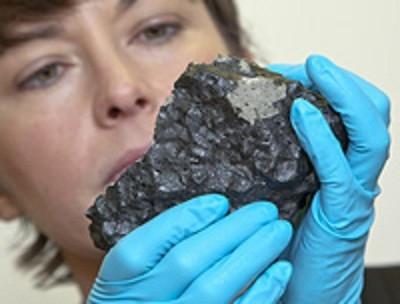Martian Meteorite on Display [VIDEO]

Researchers from the Natural History Museum in London have discovered a huge Martian meteorite which is now on temporary display in the Museum's vault gallery.
Researchers believe the meteorite will help them unravel the mysteries of Mars. The meteorite fell in a desert at Tissint in Morocco on July 18, 2011. It weighs around 1.1kg and is now the largest Martian meteorite in the museum's collection. This meteorite is also known as the Tissint Meteorite.
According to the researchers, every year about 1,000 meteorites land on Earth, ranging from the size of a football to a washing machine. Even though so many meteorites fall, it is very rare to get a Martian meteorite because it easily get contaminated when it reaches the earth's atmosphere due to moisture present in the air. The researchers should recover it very quickly before it completely gets contaminated.
"Arguably this is the most important meteorite to have fallen in 100 years and we now have the largest piece in our collection," said Dr Caroline Smith from the Natural History Museum. "Martian meteorites are incredibly rare, and when they have been seen to fall and recovered quickly, like Tissint, they offer a unique insight into the Red Planet."
"The importance of this new acquisition cannot be understated," said Dr David Parker, Director of Science, Technology and Exploration from the UK Space Agency. "And the fact that the UK now holds the largest sample of the Tissint meteorite in any public collection in the world is a great opportunity for UK planetary researchers," he added.
"Man may not set foot on Mars in the near future, but Mars has come to us. This close-up view will bring new scientific understanding, to spur our children on to further exploration on the surface of the planet itself," Dave Gheesling from the Falling Rocks Collection in Atlanta, sold the main mass to the Museum.
Watch the Video
© Copyright IBTimes 2025. All rights reserved.





















